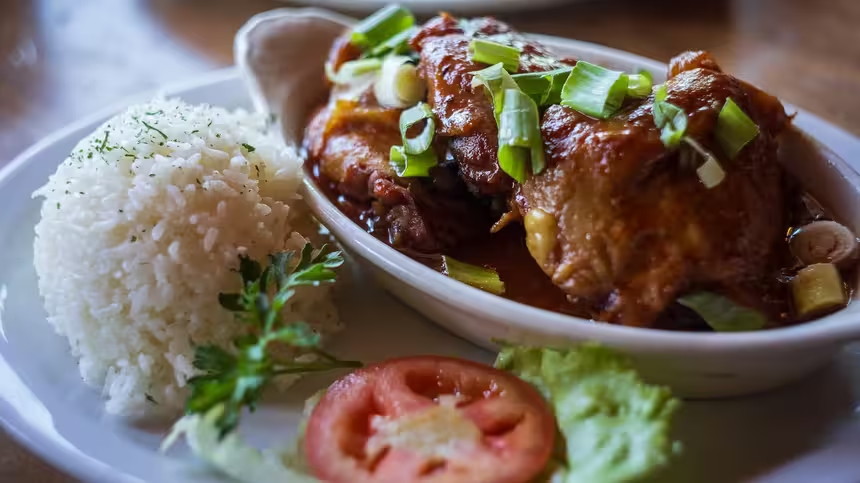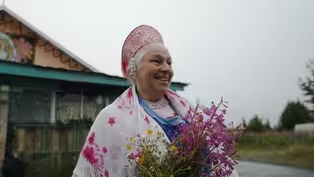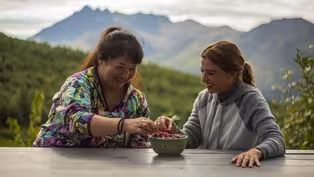
What Makes Alaska… Alaska? With Author Julia O’Malley
Clip: Episode 1 | 6m 15sVideo has Closed Captions
Anchorage-based author Julia O’Malley and Pati Jinich discuss what makes Alaska unique.
At the edge of Ship Creek in Anchorage, Alaska, where the city began in tents just over a century ago, Pati Jinich shares a picnic with local food writer and author Julia O’Malley to discuss what makes Alaska unique — and the challenges it now faces.
Problems playing video? | Closed Captioning Feedback
Problems playing video? | Closed Captioning Feedback
Support for PATI JINICH EXPLORES PANAMERICANA is provided by Marriott International, La Costeña, Texas A&M International University, Visit Anchorage, Travel Juneau, Travel Yukon, and Chicanos Por La Causa.

What Makes Alaska… Alaska? With Author Julia O’Malley
Clip: Episode 1 | 6m 15sVideo has Closed Captions
At the edge of Ship Creek in Anchorage, Alaska, where the city began in tents just over a century ago, Pati Jinich shares a picnic with local food writer and author Julia O’Malley to discuss what makes Alaska unique — and the challenges it now faces.
Problems playing video? | Closed Captioning Feedback
How to Watch Pati Jinich Explores Panamericana
Pati Jinich Explores Panamericana is available to stream on pbs.org and the free PBS App, available on iPhone, Apple TV, Android TV, Android smartphones, Amazon Fire TV, Amazon Fire Tablet, Roku, Samsung Smart TV, and Vizio.
Buy Now

The Pati Jinich Recipe Collection
Find Pati Jinich recipes from this series and more on PBS Food.Providing Support for PBS.org
Learn Moreabout PBS online sponsorshipAnchorage, Alaska is a young city, and Ship Creek is where it all began in tents about a century ago.
This is deep fried halibut.
Okay.
And it has American cheese, and a nice steamed sort of squishy bun.
And it's just, like, got everything that's perfect about a fish sandwich.
It's the perfect place to learn more about what makes Alaska unique.
With local foodie and author Julia O'Malley.
This is hilarious.
I'm just, like, shoving, like a mayonnaise sandwich like, right in the gullet.
Like, see how much the camera can just get me just getting mayonnaise all over my face.
I know.
Alaska is a place of booms and busts because it's a resource economy.
We have like from the very beginning, people were coming here from all over the world to hunt seal, to get fur.
And then they came to prospect for gold.
They're coming up on a steamship to Canada, and then they're floating all the way 2000 miles down this river, trying to find places to prospect gold.
That resource economy brings workers.
It's come exploit and take.
Right.
But it also it brings workers from all over the world, because labor in other countries you know it's basically exploiting labor from people from other countries.
But so there was were like many people from China who came to work in the gold mines and the fishing industry.
The Filipino community has very deep roots in Alaska because people have been working and fishing for more than 100 years.
And this town, you know, we have a Hmong community a Loa community, a large, you know, a Pacific Islander community.
And that would be like Samoans, Western Samoans, and then people from Tonga.
We have refugees who have come here.
We've resettled refugees here from Africa.
And it's just like a place where a lot of people from a lot of places end up here.
And I think it's it's related to our economy.
Tell me a little bit about how salmon is changing or it has changed like in your lifetime?
The most demonstrative change has occurred with king salmon, which is the Alaska state fish.
And at one time, you know, an area outside of Alaska that you drove through today, was like this one of the sport fishing capitals of the world where people could catch a 100 pound king salmon and people came from all over to do it.
But unfortunately, over time, perhaps like the last 20 years, the salmon, the king salmon are not returning.
Each year the scientists try to figure out what's going on.
What do we think is going on?
They face all kinds of predators They are dealing with heat stress.
So the oceans and rivers are warmer.
They get a parasite because the oceans and rivers are warmer.
The river water carries less oxygen.
So these fish have to make a really long trip up river in order to put their eggs at the head of the river so that they can spawn.
But even then, perhaps there's so much rain that their eggs get washed out.
Sometimes they're carrying fewer eggs and their body sizes have gotten smaller and smaller.
This kind of canary in the coal mine where you just start to feel like maybe there's going to come a point where we really shouldn't eat those fish anymore.
Everything feels precious.
Either you got it from the work of your hands, or it came from somewhere really far away.
And it's very expensive?
Yeah.
You know, we're more expensive than you're paying outside, no matter what it is, you know?
And you have kids?
I do.
And what does a future look like for them?
I don't think they'll be eating king salmon.
They won't have salmon the way we do now.
You know, you eat salmon like, all the time.
You know, it's like a very standard summertime fare.
Salmon on the grill.
And so, I mean, I don't know what that will be like for them.
I hope that the weather is, that there's still water.
Alaska might be a very much, a very attractive place to live if we continue warming at the rate that we are.
Like California might look less cool than Alaska.
I'm just saying, but yeah.
So, you know, I think, I hope that they can come up with some sane and innovative solutions that we haven't thought of.
So tell me some myths about Alaska.
You know, people talk about Alaska as if it was never occupied until the until, like, you know, first, like the Russians were the first non-indigenous people to settle it.
But Alaska has always been occupied by indigenous people.
Yeah.
And then the resources are so large, you know, oil and even the size of the salmon.
They're like as big as children.
Like 60 pound fish.
Like, you just can't believe it.
But, like, the size of the fish and the size of the fish runs and the size of the trees.
You know, down here in the Tongass, the trees are like 900 years old or older.
The sense that Alaska has like limitless resources and that it's also untouched, I don't think, I mean, there are vast expanses of the state that are pretty untouched, but it's just, it's not quite the way it seems.
What do you feel is the Alaskan DNA?
What makes Alaskans different from the rest of the United States and the Americas?
One word that explains Alaska's DNA, it's capable.
Yeah.
People here are capable.
You got like a lawyer but he also can fly a plane.
You've got like a gas station attendant, but also an amazing fisherman.
That's just kind of the way people are.
They can do a lot of stuff.
And that's really central to what we value no matter where you are.
Capable, like kind of being like an overall handyman of your entire life?
Like to be able to self start whatever situation you're in?
This place is DIY.
It's a DIY vibe.
Do it yourself.
- Yeah.
Well I brought you this.
It's just canned king salmon, and it's white king.
And I got this in Juneau where you're headed.
But white king is like, it's pretty hard to catch.
Like, you just cut open the fish and it's white.
Wow, I've never heard of white salmon.
I'm so moved.
I love gifts.
Yeah so there you go.
Thank you so much, especially when they're food.
Thank you.
So enjoy.
So this is a super delicacy?
Yeah.
It's kind of hard to find.
- I never heard of it.
Yeah, it's hard to find it.
Yeah.
Thank you.
So enjoy.
Old World Russia in America’s Last Frontier
Video has Closed Captions
Clip: Ep1 | 3m 52s | Pati Jinich tries Pelmeni in Alaska’s Russian town of Nikolaevsk. (3m 52s)
Video has Closed Captions
Clip: Ep1 | 5m 11s | Pati Jinich makes Alaskan Ice Cream with indigenous community liaison Anna Sattler. (5m 11s)
Providing Support for PBS.org
Learn Moreabout PBS online sponsorshipSupport for PBS provided by:





















